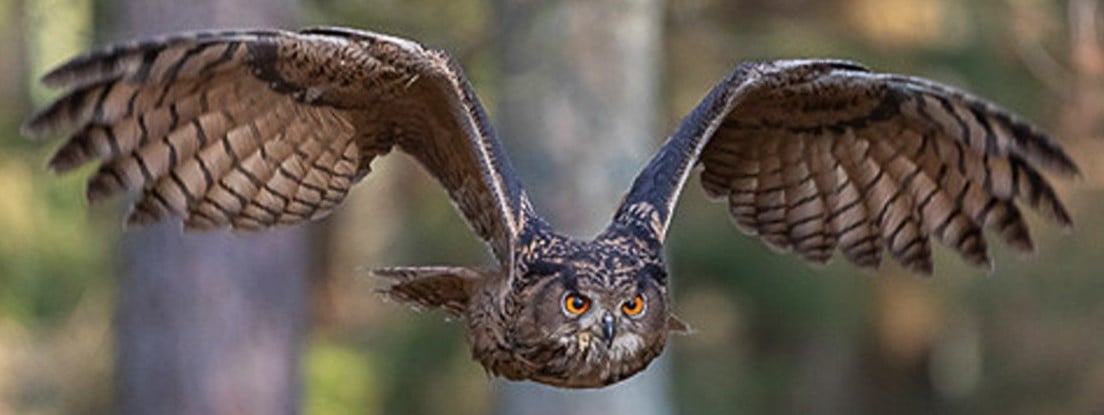Rescuers at Congress of the Birds wear a big owl mask when feeding orphaned owls so the babies don't imprint on their human caretakers
From Providence Journal
It's hot and hard to see from inside the giant owl mask, but it's important to wear it so the young, orphaned owls can someday make a successful return to the wild.
Rescuers at Congress of the Birds don the former Halloween mask so the owlets think they're being fed by an owl, or so the babies at least don't realize they're being fed by a human, says Sheida Soleimani, founder of the Providence rehabilitation facility.
"You're hot under there. You're trying to feed them. There's a lot of squinting and hoping you can get food into their mouths," Soleimani said.
But there's no complaining about those working conditions, because the job requires silence.
"In rehabilitation settings, it is extremely important that our young raptor patients do not become imprinted on people, and the only way we can prevent this is by masking our faces and staying completely silent while feeding them," Soleimani wrote in an Instagram post showing Lexi Figore, chief of staff, masked and feeding a rescued owlet as it wolfed down chunks of raw food.
"This ensures the owlets don’t associate food and care with humans, which is critical for their successful release back into the wild," Soleimani said.
One Instagram user responded, "An incredibly dedicated person."
"This is so adorable – both the chick and the mask," wrote another.
Another commenter cracked, "So when released in the wild he will be looking for big bird!!!"
All in an effort to remind the young birds that they are owls
To help the owlets understand they're owls, Congress of the Birds also places stuffed animal owls and photos of owls in their incubators. They also sometimes feed them while wearing gloves that resemble claws.
Soleimani acknowledges the giant mask with the stationary eyes probably doesn't fool the owlets into thinking "This is my mom," but she expects the mask to at least prevent the owlets from thinking any of their human caretakers are mom.
2025 has been a busy season for wildlife rescues
As of April 22, Congress of the Birds was caring for five young great horned owls. One was scheduled for release later in the day, but four younger ones will need more care before they can return to the wild.
In the best-case scenario, rescuers immediately return baby owls to their nests so that mom and dad can care for them, but sometimes that's not possible; maybe the nest has been destroyed, or the parents have died.
Owls that imprint on humans can't survive in the wild
With baby owls that can't be reunited with their parents, humans nurse them along until they're old enough to fly and hunt. The rescuers must strike a delicate balance. The urge to hold the fuzzy babies is strong. Owlets imprint quickly, according to Soleimani, and they won't survive in the wild if they imprint on their human caretakers.
"They can't hunt for themselves. They really can't do anything," she said.
Owls imprinted on humans have even attacked people in an effort to find food, according to Soleimani.
The younger they are when rescued, the more likely they are to imprint on their human caretakers. One of the owlets rescued this spring hatched in the care of Congress of the Birds.
Owls aren't the only type of babies that imprint on their human caretakers. It's an issue for all baby raptors, as well as ravens. To prevent that, Congress of the Birds also has eagle and hawk masks. This year, they've been using a raven mask when feeding four baby common ravens rescued this spring.
Springtime in Rhode Island brings new hatchlings and the start of the busy season for Congress of the Birds and other wildlife rehabilitators. Birds can lose their homes when trees are cut down, or even when bushes are cleared, which is how four American woodcocks ended up in their care.
"Spring is our wildest season, and right now, our food bill is sky-high," Congress of the Birds wrote in another post, showing the four baby ravens, beaks open and pointing at the ceiling.
The ravens eat $50 worth of mice daily, and it costs another $50 each day to feed the four owlets. Congress of the Birds is looking for volunteers and asking for donations. (It has plenty of worms after seeking worm donations for its American woodcocks.)
Soleimani would also welcome donations from artists who could make papier-mâché masks of raptors. She's an artist herself, but she's busy this spring caring for a lot of baby birds.





Holy shit! They're using Owlbears to raise the chicks!
Ironically, possibly still better than having a human do it, supposing the owlbear is open to it.